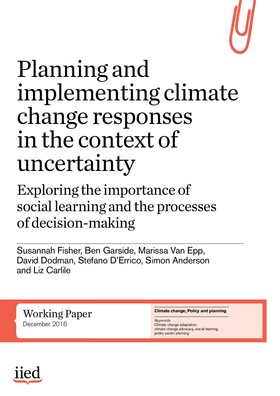Planning and implementing climate change responses in the context of uncertainty

Significant uncertainties around future climate change challenge the implementation of policies and programmes. Mobilising action that can respond to climate change and be flexible enough to learn from new experiences as well as adapt to unknowns is difficult, given traditional short-term timeframes, sector silos and the predominantly top-down nature of planning cycles. Process-driven approaches, such as social learning, offer a more flexible approach to tackling climate uncertainties. These approaches place the emphasis on building the capacity, knowledge, evidence and stakeholder relationships necessary to support first short-term and then longer-term decision making and action.
Cite this publication
Available at https://www.iied.org/10172iied


